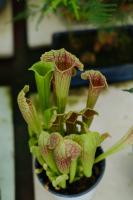Is water isotonic to plant cells?
Plant cells are enclosed by a rigid cell wall that maintains the shape and structure of the cell. However, water is essential for the survival of plant cells as it provides various nutrients and helps in photosynthesis. Hence, it is important to understand whether water is isotonic to plant cells or not.
What is isotonicity?
Isotonicity refers to the state where the concentration of solutes inside and outside the cell is equal. It means that the water potential of the cell is the same as that of the surrounding medium. This state of equilibrium is crucial for the proper functioning of the cell.
Water potential in plant cells
Plant cells have a unique ability to maintain their shape and size even when placed in a hypotonic or hypertonic solution. This property is due to the presence of a cell wall that exerts turgor pressure on the cell contents. Turgor pressure is the pressure exerted by the cell wall on the cell contents, and it occurs when the concentration of solutes inside the cell is higher than that in the surrounding medium.
Water potential is the energy associated with the water molecules, and it determines the direction of water movement. In plant cells, the water potential is a sum of the solute potential and the pressure potential. Solute potential is the energy related to the concentration of solutes, while the pressure potential is the energy related to the turgor pressure.
Water potential and osmosis
Osmosis is the movement of water across a semi-permeable membrane from a region of higher water potential to a region of lower water potential. The rate of osmosis depends on the difference in water potential across the membrane.
When a plant cell is placed in a hypotonic solution, water enters the cell due to the higher water potential outside the cell. However, the cell wall exerts turgor pressure and prevents the cell from bursting. In contrast, when a plant cell is placed in a hypertonic solution, water moves out of the cell due to the higher water potential inside the cell. This causes the cell to shrink and lose turgor pressure.
Is water isotonic to plant cells?
Based on the above discussion, we can conclude that water is not isotonic to plant cells. Plant cells need a hypotonic solution for proper functioning as it allows water to enter the cell, maintain turgor pressure, and provide the necessary nutrients for growth and development. However, if the solution is hypertonic, the cell will lose water and eventually die.
In conclusion, water plays a critical role in the survival and functioning of plant cells. The isotonicity of water is essential for proper water movement and turgor pressure regulation. Therefore, understanding the water potential of plant cells is important for the cultivation of healthy plants, and researchers and farmers should pay attention to the hydration needs of plants.

 how many times do yo...
how many times do yo... how many planted tre...
how many planted tre... how many pine trees ...
how many pine trees ... how many pecan trees...
how many pecan trees... how many plants comp...
how many plants comp... how many plants can ...
how many plants can ... how many plants and ...
how many plants and ... how many pepper plan...
how many pepper plan...




























